BITS AND PIECES
ON THE COURTEOUSLY DISRESPECTFUL TONE OF VOICE.
SOCRATES AFTER BEING CONDEMNED TO DEATH.
It is not lack of arguments that has caused my condemnation, but a lack of effrontery and impudence, and the fact that I have refused to address you in the way which would give you most pleasure. You would have liked to hear me weep and wail, doing and saying all sorts of things which I regard as unworthy of myself, but which you are used to hearing from other people. But I did not think then that I ought to stoop to servility because I was in danger, and I do not regret now the way in which I pleaded my case; I would much rather die as the result of this defence than live as the result of the other sort... I suggest, gentlemen, that the difficulty is not so much to escape death; the real difficulty is to escape from doing wrong, which is far more fleet of foot. In this present instance, I, the slow old man, have been overtaken by the slower of the two, but my accusers, who are clever and quick, have been overtaken by the faster: by iniquity. When I leave this court I shall go away condemned by you to death, but they will go away convicted by Truth herself of depravity and wickedness.
PLATO: Apology.
OSIP MANDELSTAM TO STALIN.
You took away all the oceans and all the room.
You gave me my shoe-size with bars round it.
Where did it get you ? Nowhere.
You left me my lips, and they shape words, even in silence.
(Translated by Clarence Brown and W.S. Merwin.)
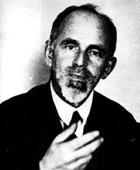
OSIP MANDELSTAM.
JOSEPH BRODSKY TO SOVIET OFFICIALS WHO SAID HE WAS A PARASITE.
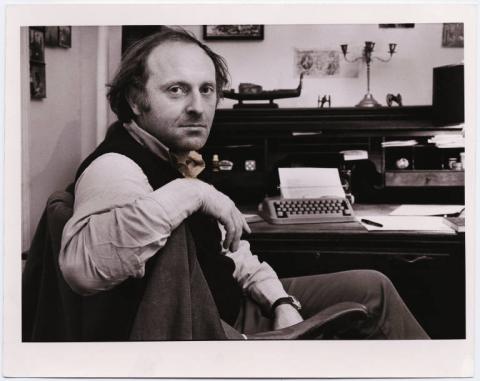
There, still a boy, he was judged for being a poet, and by definition a loafer. It seems that he was the only writer in Russia to whom they applied that recently invented, barbaric law -which punished for the lack of desire to make money. Of course, that was not the point -with their animal instinct they already sensed full well just who stood before them...
"Who appointed you a poet?" they screamed at him.
"I thought.... I thought it was God."
Tatyana Tolstoya on Joseph Brodsky, in Robert B Silvers and Barbara Epstein: The Company They Kept, Writers on Unforgettable Friendships, New York Review Books, 2006.
SIGMUND FREUD AND THE GESTAPO.
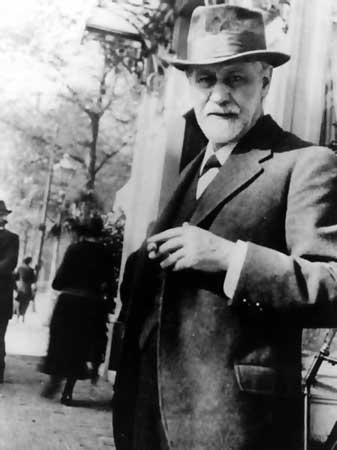
Before Freud was granted the exit visa he needed to escape from Vienna, he was made to sign a document: "I, Prof. Freud, hereby confirm that after the Anschluss of Austria to the German Reich I have been treated by the German authorities and particularly by the Gestapo with all the respect and consideration due to my scientific reputation, that I could live and work in full freedom, that I could continue to pursue my activities in every way I desired, that I found full support from all concerned in this respect, and that I have not the slightest reason for any complaint."
Freud signed, but added in his own writing, "I can heartily recommend the Gestapo to anyone".
FROM A CONVERSATION WITH ISAIAH BERLIN.
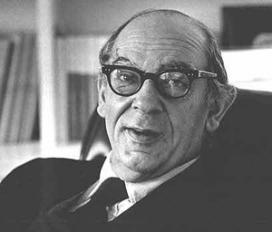
A year or so before his death, the New College Record wanted me to interview Isaiah Berlin, among other things on the topic of his experience of being a Fellow in Philosophy at the College. He agreed to this and I went to his house in Headington.
As an undergraduate I had gone to his hugely attended lectures on political philosophy and had found them an exhilarating change from the rather dry philosophy that prevailed in Oxford at that time. The exhilaration came partly from the manner of delivery -the energy and speed with which the torrent of words was poured out- but also from the intellectual excitement and the range of reference, especially to Russian novelists, Russian and Jewish nineteenth century thinkers some of whom I had not even heard of before. We had met briefly a few times over the years but I thought he was unlikely to remember me, and I was a bit sorry that the emphasis of our conversation was supposed to be on his memories of New College, as -much as I love the place, where I taught for thirty years- it would probably be more exciting to talk about Herzen, Bakunin or Anna Akhmatova. So I approached Headington with rather mixed feelings.
He cheered me up very quickly. He had a problem with his voice and so was hard to hear, but he could not have been more welcoming. And he very quickly made it clear that he had found most of the Fellows of New College in his time to be worthy, decent and dull. It was not a time of his life he had found very interesting. He said a bit about it and -to his relief and my pleasure- we felt free to move on to other things.
Because his voice was weak, the tape recording gives a poor sound quality when he is talking, and not all of the conversation was for public reproduction. But here are four bits of it.
In the first extract he talks about novels, about his meeting with Anna Akhmatova, about Pasternak and about Tolstoy.
In the second extract the conversation turns to some of his philosophical contemporaries: Elizabeth Anscombe, R.G. Collingwood, Stuart Hampshire, Peter Strawson and Bernard Williams.
In the third extract Berlin recounts a famous story about Winston Churchill and talks more generally about Churchill, the war, about W.H Auden and Christopher Isherwood.
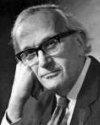
HERBERT HART.
In the final extract, Isaiah Berlin talked about the great legal philosopher Herbert Hart, who was his colleague and friend when they were both Fellows in Philosophy at New College, and also about an unexpected precursor who first stated of one of Berlin's central ideas.
ON THE TRUTHFULNESS AND CHILDLIKE LITERALNESS OF PHILOSOPHY: G.E. MOORE AND THE FINE LINE BETWEEN INTEGRITY AND ABSURDITY.
It was over a hundred years ago, but there are still some reverberations from it in philosophy. Maynard Keynes described the impact of G.E. Moore's Principia Ethica on his generation in Cambridge: "it was exciting, exhilarating, the beginning of a renaissance, the opening of a new heaven on a new earth, we were the forerunners of a new dispensation, we were not afraid of anything." On Moore's theory, goodness was an objective quality of things. Central was the goodness of various states of mind. To illustrate Moore's method of discussion, Keynes described disagreements about which of these states of mind were valuable:
How did we know what states of mind were good? This was a matter of direct inspection, of direct unanalysable intuition about which it was useless and impossible to argue. In that case who was right when there was a difference of opinion?... In practice, victory was with those who could speak with the greatest appearance of clear, undoubting conviction and could best use the accents of infallibility. Moore at this time was a master of this method -greeting one's remarks with a gasp of incredulity -Do you really think that, an expression of face as if to hear such a thing said reduced him to wonder verging on imbecility, with his mouth wide open and wagging his head in the negative so violently that his hair shook. Oh! he would say, goggling at you as if either you or he must be mad; and no reply was possible.
Keynes goes on to talk about the unworldliness of Moore's chapter on The Ideal, in which these mental states and their complex gradations of goodness were described with the kind of precision appropriate to complicated physical objects, saying that the chapter
conveys the beauty of the literalness of Moore's mind, the pure and passionate intensity of his vision, unfanciful and undressed-up. Moore had a nightmare once in which he could not distinguish propositions from tables. But even when he was awake, he could not distinguish love and beauty and truth from the furniture. They took on the same definition of outline, the same stable, solid, objective qualities and common-sense reality.
J.M. Keynes: My Early Beliefs.
This pure and passionate literalness was naive in the way Keynes brings out. But it also was part of the integrity that others rightly saw in Moore, the demand for precision and for the clear, plain statement which made cloudy philosophical formulations wilt under his questions. Some -with good reason- thought he had the literalness of a child. Virginia Woolf in her diary in 1940 noticed "Moore's candid childs eyes". Twenty years before, her diary had described an encounter when Moore was staying at the Woolf's house:
I lay in the shallow light, which should be written dark, I think, a long time, & then Moore came & took a cold bath at 1 in the morning, consequently I was too muddled next morning to follow his explanation of Berkeley. He has grown grey, sunken, toothless perhaps. His eyes small, watchful, but perhaps not so piercing as of old. A lack of mass, somewhere. He went off to take "my baby for a walk". I dont see altogether why he was such a dominator & dictator of youth. Perhaps Cambridge is too much of a cave. Yet (I don't attempt to balance this properly) of course there's his entire innocency & shrewdness, not the vestige of falsehood obscuring him anywhere.
Virginia Woolf: Diary, 23 June, 1920.
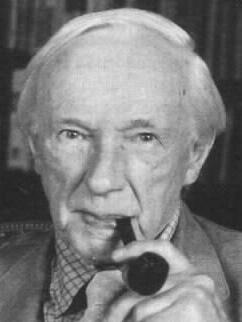
It is tempting to treat the extreme literalness and precision as a bit comic. In a discussion of issues about free-will I once quoted Moore: "It is true, as a rule, that cats can climb trees, whereas dogs can't" and said that I liked "as a rule": no-one is going to catch out Moore by citing some cat with amputated legs.
In one way, the teasing is unfair. Trying to be extremely precise is part of how serious philosophy resists bad philosophy's gravitational pull towards talking nonsense. (In the "Travesties and Encounters" section of this website, see the "encounter" between Moore and Slavoj Zizek.)
But there is a fine line between integrity and absurdity. It is possible to teeter over the edge. The journalist Alan Watkins described once lodging with Moore and his wife in Cambridge. Dorothy Moore took a somewhat bossy interest in their tenants:
She once insisted on selling us a gate-leg table for £10 on the ground that it was genuine Jacobean. We never discovered whether it was or not. Sometimes she would invite us to tea with Moore and herself. Mrs. Moore was voluble, and he confined himself to interjections. She was once talking about a table that some of their previous tenants had bought. Odd how everything to do with Moore seems to come down to tables.
"You see," she explained, "they wanted it to have tea on."
"No, no, dear," he said. "That's not quite right. Coffee too."
Alan Watkins: Brief Lives.
MORE ON THE INNOCENCE OF PHILOSOPHERS.
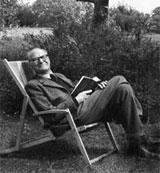
GILBERT RYLE
Jerry Cohen reported a conversation with Gilbert Ryle, in which Ryle said that "unlike pain, pleasure does not have a bodily location". Jerry gave the counterexample of sexual pleasure. Ryle replied, "Well, yes, there is that case. But I was thinking of something more interesting."
(Taken from Gerald Dworkin's In Memoriam G.A. (Jerry) Cohen, on the website 3 Quarks Daily.
CHILDREN ARE NATURAL PHILOSOPHERS.
Finding themselves in a world where there is so much that they do not understand, children explore and ask questions. Many of the questions are scientific: Why is snow so cold? How big is the world? Are there still dinosaurs? But the questions do not stop there. Does my cat think? Do you see red the same way I do? Can I know for sure that my friends really like me? Is there a God who listens to prayers? Is it bad to kill animals and eat them?
There is a nice instance given by Bryan Magee from his own childhood. Of course Bryan Magee became a philosopher, which is fairly rare. But, just as many children ask scientific questions without going on to become scientists, many people who did not become philosophers will perhaps remember wondering as children about questions of this sort:
I retain a vivid memory of myself... when I was seven or eight, standing in a shaft of sunlight in the corner of the kitchen by our back door, between a barred window and a green wooden wall, focusing my eyes keenly on the index finger of my right hand, which I held pointed upwards in front of my face. I'm going to count to three, I was saying to myself, and when I say "three" my finger's going to bend. Then I counted: One, two, thr- And sure enough on three my finger bent. How did I do it? I did it again. Then I thought: This time I'll count to four. And on four my finger bent. Next time I counted to five. My finger bent on five. I tried dragging out the counting so as to catch my finger out; one, two... three...four... [wait for it]... five! But on five my finger, not caught napping at all, bent. I could bend my finger whenever I liked. Or not, just as I decided. Yet no matter how hard I concentrated I couldn't grasp anything at all about how I did it. How could something that was so completely within my command, solely and entirely a matter of my own conscious decision, be a nothing for me, just simply no experience whatever, and yet happen? From that day to this the problem has fascinated me.
Bryan Magee: Confessions of a Philosopher.
The fact (if it is a fact) that fewer adults are interested in philosophical questions is a bit sad. It may reflect being discouraged as children by family, teachers or others of an excessively practical bent. "Don't waste your time on that kind of thing. It doesn't matter whether the cat can think and you won't get a good job if you don't get on with your Geography homework." It may reflect a defeated sense that these are not questions where we can make progress towards answers, a gloomy view that philosophers could do more to dispel. Whatever the causes, it is a human loss if these questions die out in someone. (John Donne: "We go through life never thoroughly awake".)
There have been many recent advances in the study of the cognitive psychology of children. We are putting together a fuller and richer picture of how children make causal maps of the world, and how they imagine alternative possibilities about the world, and about the minds of other people and of themselves. An excellent recent account is Alison Gopnik's The Philosophical Baby, What children's minds tell us about truth, love and the meaning of life. Developmental psychology is full of references to imagined counterfactuals. All this supports the view that the scientific and philosophical questions children ask are continuous with the questions they have to ask even to develop the commonsense picture of the world that excessively practical people think is the only one needed.
Perhaps there should be more philosophy written for children. It is one of the great virtues of Thomas Nagel's book What does it all mean? that, as well as being faithful to the nature of some of the fundamental questions, it can also be read by (some) pre-teenage children. Some books about philosophy are either aimed at children as readers or are about philosophical conversation with children. They include Gareth B. Matthews: Dialogues with Children, Marilyn Bowles: Philosophy for Children, and David White: Philosophy for Kids.
I made a brief attempt once in answer to a request by my daughter, Ruth. Just before her eighth birthday, she asked me to include with her presents a letter about how we can know the difference between what is imagined and what is real. Unfortunately a letter, unlike a conversation, is a monologue. So, of course, if children want to think about philosophy (or anything else) a conversation is better. Although talking to children about such things is important, listening to them is even more so. But here is the attempt I made. It is Ruth's letter, but she has given me permission to reprint it here. Time has rushed by. This letter was put on the website on the thirteenth birthday of Ruth's son, and my grandson, Sam.
A LETTER TO RUTH.
Dear Ruth
You asked me to write to you about Imagination, and what is real.
How do we know what the world is like? We know it through our senses. We know the sky is blue because we see it is. We know birds sing because we hear them. We know a cat's coat is silky because we can feel it. We know snow is cold because we can feel that too. And we know the taste of oranges or the smell of smoke because we have senses for them too.
When we use our senses, we have experiences. If someone fires a gun, the experience we have is hearing a loud bang. If Chilky is hungry, the experience we have is feeling someone rubbing against our legs. When we look down, we have the experience of seeing a cat looking up at us, and hearing her purr.
Usually, our experiences and the things that cause them are very like each other. We feel cold when we touch snow, because snow is cold. When we look at an elephant, we have an experience of something bigger than when we look at a dog, because elephants are bigger than dogs.
It is rather like what we see on television. The grass at a football match looks green on television, because the picture on the screen is very like the real football pitch the cameras are filming. Our experiences are a bit like the pictures on the television screen. Usually, our experiences are very like the things that are near us. If you have an experience of seeing a dog bounding towards you, this is probably because a dog is bounding towards you.
Sometimes television pictures go wrong:
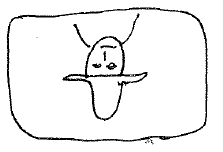
I once had a television where it always seemed to be snowing at the football match:
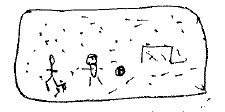
And it always seemed to be snowing indoors too:
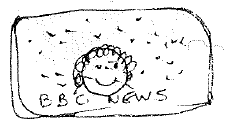
Because it snowed all the time on this television, I knew that it was not really snowing at the football, but something was wrong with the television.
This kind of thing can happen with people's experiences too. Vivette takes off her contact lenses when she goes to bed. Then everything looks blurry to her. If she was not very clever, she might think, "isn't it funny how the world changes? Hot in summer, cold in winter. Sharp in the day, blurry at bedtime."
But she knows with this blurriness that it is only her experience that changes, not the world.. Just like the snow on the screen, that isn't there on the football pitch. Like the picture on television, our experiences are usually very like things in the world, but not always.
Some ways our experiences are not like what is there in front of us
Sometimes we do not see what is there. If you wake up in the night, and it is pitch dark, your pink dress is on the chair beside you, but do you see it? No. If you look over there, all you see is this:
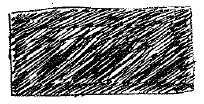
That is where the thing is there (the dress) but you don't have the experience.
Sometimes it is the other way round. You have an experience, but it is not of any thing that is there. Shut your eyes and think of Chilky.
Just then you had an experience of a cat without any cat being there. This happens when you dream too. There are three different experiences:
Seeing a cat
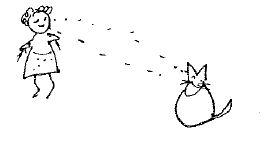
Imagining a cat
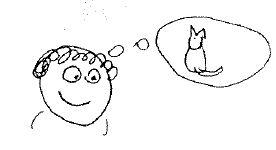
Dreaming about a cat
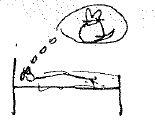
Can you always tell which you are doing? Sometimes it is easy to tell. Shut your eyes and think of Chilky again.
What that just the same as seeing Chilky? Or was it somehow fainter? And could you see how many whiskers she had, or exactly where the white changes to black? It is really a bit different from seeing.
Let's think about another experience with Chilky in it. You and she are in India, and she turns to you and says, "the trouble with these Indian cats is that they eat nothing but curry." Is this real, or can you tell it is a dream?
So we can tell that some of our experiences are not of something really there, because the experiences are different.
But is the experience seems real, does this mean it always is? Perhaps I could imagine or dream something in a very lifelike way? This does sometimes happen. Some people have hallucinations, where their experience is just like something real. Very thirsty people in the desert keep thinking they see an oasis with trees and water in front of them, when there is not really anything there.
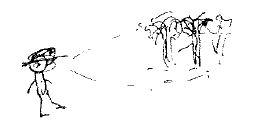
How can we tell whether something is real or a hallucination?
Look at the chair. Is it real, or could it be a hallucination?
The first test
Go near the chair. One reason for thinking it is real is that it does not fade away when you go close to it. The oasis in the desert always seems to fade away when we try to go to it. You never seem to reach it.
The second test
And you can't touch the oasis.
Go up to the chair and touch it. Your sense of touch agrees with your sense of sight. Two senses are less likely to be wrong than one. Gently bang the chair and listen. If you heard a sound, you have three senses that agree. It is even less likely that all three are wrong.
But perhaps all your senses could be wrong. It is not very likely, but you might have an illness that has made all your senses go wrong. Another test might show this.
The third test
Ask other people. If other people all tell you they don't see what you think you see, this is a reason for thinking you might be wrong. (Of course, they might be teasing you, or their senses may have gone wrong. But if everyone disagrees with you, this suggests you may be wrong.) I think poppies in a field are rather hard to see. Most other people think they are very bright. Is this a reason for thinking there is something wrong with my way of seeing colours?
Suppose you have an experience that passes all the tests. The chair doesn't fade away when you go close. All your senses agree that it is there, and other people agree too. You have very good reasons for thinking the thing is really there.
But could you still be wrong? Well, you could. It could be that all your senses are wrong. They could be giving you wrong ideas about the chair, and about what other people are saying. It could be a very realistic dream. But, when you have used all the tests, you are much less likely to be wrong.
All this shows that we can never be quite certain of anything. Anything we think may be wrong. But using the tests makes us very unlikely to be wrong. We can't be quite certain, but we can be certain enough not to worry.
We could both be dreaming it is your birthday today. But I bet we aren't.
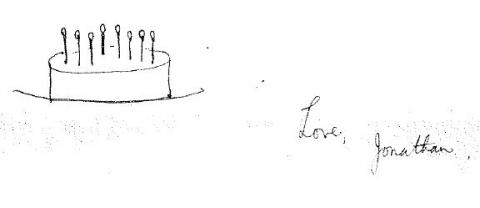
A FEW YEARS BEFORE, RUTH'S OLDER BROTHERS DISAGREED WITH EACH OTHER.
This next television documentary, about ethical questions raised by genetic engineering, was ostensibly presented by me. But children are natural philosophers, and the stars of the programme were Ruth's older brothers, Daniel and David. While I was out making coffee for the television crew, they persuaded the producers that they should be on the programme. I was dubious about this, but -as often- they turned out to be right.
ON NOT BEING INTIMIDATED BY PHILOSOPHY.
Learning to think about philosophy is, among mother things, to acquire a set of intellectual habits and skills. It includes being introduced to the ideas and arguments of some of the great philosophers as they tried to answer philosophical questions. But it is also about using rational methods in thinking for yourself about the questions.
There is a kind of intimidation that can make thinking for yourself seem hopeless. It can take years -perhaps eternity- to get on top of the philosophy of Kant or Hegel or Wittgenstein. And who can possibly keep up with the flood of often technical articles by professional philosophers in the journals each year? Who would want to do so, even if they had the time? So students can be made to feel utterly disqualified from getting anywhere with the subject.
But it matters that people should go on thinking, as clearly and as rationally as they can, about some of the most important and interesting questions ever asked. So it is important to oppose this intimidation. Yes, we all lack important qualifications, but, for all that they tower above us, so did Kant, Hegel and Wittgenstein. A good part of teaching philosophy is a matter of getting across (not usually by explicit statement) that, while we lack the brilliance of the best philosophers, we can still make progress with the questions and still have a really interesting time doing so.
Here are contributions to the campaign against intimidation by two people who, although not Kant, Hegel or Wittgenstein, were themselves by any reasonable standards brilliant and inspiring philosophers.
Works of philosophy are written as though their authors believe them to be the absolutely final word on their subject. But it is not, surely, that each philosopher thinks that he finally, thank God, has found the truth and built an impregnable fortress around it. We are all actually much more modest than that. For good reason. Having thought long and hard about the view he proposes, a philosopher has a reasonably good view about its weak points; the places where great intellectual weight is placed upon something perhaps too fragile to bear it, the places where the unravelling of the view might begin, the unprobed assumptions he feels uneasy about. One form of philosophical activity feels like pushing and shoving things to fit into some fixed perimeter of specified shape. All those things are lying out there, and they must be fit in. You push and shove the material into the rigid area getting it into the boundary on one side, and it bulges out on another. You run around and press in the protruding bulge, producing yet another in another place. So you push and shove and clip off corners from the things so they'll fit and you press in until finally almost everything sits unstably more or less in there; what doesn't gets heaved away so that it won't be noticed... Quickly, you find an angle from which it looks like an exact fit and take a snapshot, at a fast shutter speed before something else bulges out too noticeably... All that remains is to publish the photograph as a representation of exactly how things are, and to note how nothing fits properly into any other shape.
Robert Nozick: Anarchy, State and Utopia.
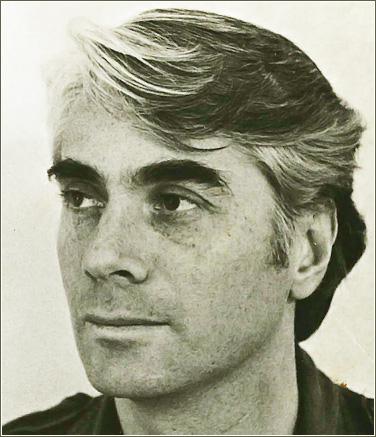
Isn't it ludicrous for someone just one generation from the shtetl, a pisher from Brownsville and East Flatbush in Brooklyn, even to touch on the topics of the monumental thinkers? Of course it is. Yet it was ludicrous for them too. We are all just a few years past something or other, if only childhood. Even the monuments themselves, so serenely in command of culture and intellect, must have been children once and adolescents -so they too are immigrants to the realm of thought. It wouldn't hurt for an acknowledgement of this occasionally through their magisterial prose to peep.
Robert Nozick: Philosophical Explanations.

BERNARD WILLIAMS.
It would be a bad friend of philosophy who did not admit that there is quite a lot of philosophical work that is unrewarding by any standard: unhelpful, boring, sterile. The awful fact is that some of it hardly tries to be anything else. It consists of exercises that are necessary for the structure of philosophy as providing an academic career. The professionalization of philosophy has being going on for more than a century (or longer, if you count the Middle Ages), but it is now at an unprecedented level. It undeniably brings its own deformations, and the question that Stravinsky used to ask disobligingly about much contemporary music -"Who needs it?"- can be pressed against many products of academic philosophy.
Bernard Williams: What Might Philosophy Become?
And finally, three mild antidotes to philosophical or ethical self-importance:
REMEMBERING DOING A DEGREE IN PHILOSOPHY.
I was once working with the television documentary-maker Oliver Morse. At one point he mentioned having once done a degree in philosophy. I asked what he had got from it. He said he did not remember much about it. "But I do remember one article. I forget what it was about. Its final sentence was "only three ducks remained."."
A POLICE INSPECTOR INTERVIEWS A PHILOSOPHER.
BONES: What is it that you do?
GEORGE: I'm a professor of moral philosophy.
BONES (wagging a finger): I'm very glad you said that, son.
BONES: Is God what?
(He is reading the first page of the typescript.)
GEORGE: It is a paper I am presenting to the symposium at the university... It would be a great opportunity if only I could sieze it... I mean, it's really the event of the year (Pause.) In the world of moral philosophy, that is.
BONES: (putting down the script) It's not a world I move in very much.
Tom Stoppard: Jumpers.